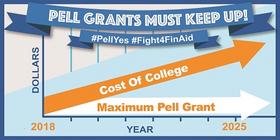Getting college scholarships involves much more than filling out applications and writing essays. There are both practical and creative steps that must be taken to help you win as many scholarships as possible. As a current or future community college student, you’re already one step ahead by choosing a far less expensive school than four-year or private school options. You can make your community college expenses even less with a little work.
It’s never too early to start searching for scholarships. As surprising as it may sound, many college scholarship programs are available for students in their freshman, sophomore, or junior years of high school, as well as for students in elementary and middle school! That being the case, waiting until your senior year to locate and apply for scholarships puts you at risk because you could miss out on all scholarship opportunities.
It’s also vital to start your scholarship search early because it’s a time-consuming process that requires a healthy commitment of time and energy. Each application will have its unique requirements, and the time it takes to gather transcripts, letters of recommendation, and other required materials can be up to several weeks. And while thousands of students receive scholarships each year, not everyone will get something in return for all their hard work on their application materials. Although it can be discouraging not to receive any award letters in the mail, you definitely won’t get any if you give up. Committing yourself to applying will only increase your chances of getting a scholarship.
Think you don't have time to apply for a scholarship? This video explains why that is a must.
Another critical element of starting early is filling out the Free Application for Federal Student Aid (FAFSA). Schools and organizations often use the FAFSA to determine your eligibility for their award programs. The FAFSA comes online each January and must be filled out each year. If you’re heading to community college in the fall, fill out the FAFSA the prior spring. Many scholarships (and other financial aid awards, such as grants) also work on a first-come, first-served basis, so the sooner you get your FAFSA completed and submitted, the better your chances of getting the scholarships you need.
Boost Your College Resume
Scholarship committees receive dozens, hundreds, or even thousands of applications to review. With such stiff competition, you need to stand out from the crowd. To do that, boost your college resume by getting involved in activities such as:
- Challenging classes—While your GPA is undoubtedly important in determining your eligibility for merit-based scholarships, committees will look beyond your GPA and examine the courses you took in high school. A high GPA is impressive, but taking upper-level classes, such as honors, AP, or IB courses, is much more impressive. Also, be sure you have a variety of courses on your transcript to show that you can be successful in several academic areas.
- Extracurricular activities – Participating in extracurricular activities shows that you are a well-rounded student capable of success in and out of the classroom. Involving clubs or sports is also a great way to open up additional scholarship opportunities for particular organizations or sports.
- Volunteer work—Scholarship committees (and admissions officers) love to see students devote time to helping others. Where you volunteer doesn’t necessarily matter, but demonstrating a desire to improve your community or help others will leave a lasting impression on the individuals reviewing your application.
Be Smart When Applying
When applying for scholarships, you’ll need to play to your strengths. Conduct a scholarship search for areas related to your intended major. There are several excellent free search tools and resources at your disposal:
- State higher education agencies
- Federal agencies
- U.S. Department of Labor’s Scholarship Search Tool
- Your high school guidance office
- Your local library
- The financial aid office at your school of choice
- Your employer or your parents’ employers
- Professional organizations related to your intended major
Also, consider personal qualities that might qualify you for scholarships, such as religion, ethnicity, or disability. If you’re a first-generation college student or come from a family that has experienced financial distress, additional scholarship opportunities will be available. Additionally, if you’ve got an outstanding GPA and a history of success in rigorous courses, you can apply for merit-based scholarships.
It’s also beneficial to apply for every scholarship for which you are eligible. Casting a wide net will increase your chances of getting more awards. To boost your chances further, look for scholarships that typically don’t get many applications. Scholarships that award small amounts of money (say, less than $500) or require applicants to write a lengthy essay are often less competitive because students tend to focus on big awards or those that don’t need extra work.
Many community colleges also offer guaranteed scholarships for students from local high schools or those who live within the state. The Wyoming Community College System, including Casper College, offers various awards for its merit-based Hathaway Scholarship program. With various eligibility levels, most students can receive some level of award upon graduating from high school. Other states, such as Ohio and California, offer similar programs to in-state students to boost the number of students pursuing post-secondary education.
Matthew Lesko offers eighteen sources for college money.
Pay Attention to Details and Deadlines
Far and away, the most common reason why students do not get scholarships and other forms of financial aid is because they don’t adhere to the directions. A section of the application left unfilled, an essay that doesn’t meet the requirements, or sending your application materials to the wrong person or address can mean the difference between getting a scholarship and taking out a student loan instead.
Some scholarships have particular eligibility requirements. Reading the application instructions thoroughly will help you ensure that you meet all the application criteria and avoid wasting time applying for a scholarship for which you are not eligible. Additionally, many scholarships have requirements that may seem silly or arbitrary. But no matter what is required of each application, read the instructions carefully and follow the letter's requirements. If there is confusion about the scholarship requirements, don’t hesitate to ask for help. Scholarship sponsors can guide you about their specific requirements.
In addition to varying eligibility requirements, every scholarship seems to have a different application deadline. Many deadlines occur in the springtime, while some scholarships have open application periods with no deadline. To stay on track, mark important dates in a calendar, keeping in mind that gathering all the materials for each scholarship application can take you a few weeks. You’ll need to give yourself plenty of time to write an essay (if required) and get letters of recommendation, transcripts, and other documents needed for the scholarship application.
With thousands of applications that scholarship committees receive each year, something is bound to get lost. Before sending any application materials off, make copies of everything and put them in a file. If part of your application goes missing, you can easily mail or fax the missing page. Keeping an eye on the details and staying organized can determine whether you get a scholarship.
Choose References Wisely
When choosing references or people to provide a letter of recommendation, look for people who can give specific details about your academic performance, work ethic, drive to succeed, and other positive traits. Your references must be people who have worked with you in some capacity, whether a teacher, school administrator, supervisor at work, volunteer coordinator, or club sponsor or coach. Whomever you choose should be able to speak about your strengths and provide insight into why you are the best applicant for the scholarship.
When asking people to serve as a reference, explain the purpose for which you need the reference. If applying for a specific scholarship, such as a science-related award, asking a science teacher to provide specific details about your abilities is a good idea. If applying for a merit-based award, ask a teacher or administrator who knows first-hand your academic skills. Also, be sure to give your references plenty of time to write you a letter of recommendation. A good rule of thumb is to provide at least two weeks' notice before you need the letter returned.
Clean Up Your Online Reputation
In today’s technology-driven world, scholarship committees may well Google your name to see if what you say and do on Facebook and Twitter reflects what you talk about in your application materials. Before sending off your first scholarship application, review your social media accounts and delete anything that may reflect poorly on you. Remove anything that others might see as being inappropriate or immature. You can also set your accounts to private to ensure only your friends can see what you post online. Be sure that you have an appropriate email address as well. If you need to, sign up for a new account that follows the firstname.lastname@email.com format.
Write an Amazing Essay
The importance and weight that a scholarship essay carries cannot be understated. Reviewers often rely on the essay as the most important aspect of their decision-making process. To put your best foot forward, consider the following:
- Learn about your audience – Tailoring your essay to each specific scholarship is incredibly important. Investigate the scholarship sponsor to determine the organization’s goals. Aligning your essay to their mission will make your essay stand out.
- Make it personal – Your essay should show who you are. The best way to do this is to make the essay personal. If you can select your topic, it should interest you and demonstrate your passion for the subject. If the topic is chosen for you, incorporate your personal experiences as they relate to it. If possible, discuss challenges or obstacles you’ve overcome in your life. Scholarship committees want to help students make the most of their lives, and making these personal connections will make your application more attractive.
- Be enthusiastic—Your essay shouldn’t read like it was a chore to write. By writing with enthusiasm, you demonstrate your love of learning and your dedication to improving yourself. Remember that the scholarship committee represents an organization with specific goals, and you should demonstrate an understanding and excitement for those same goals.
- Demonstrate your impact—Talking about the positive impacts you have on the people around you or on your community is highly impressive to scholarship committees. Discuss any volunteer projects you’ve undertaken, outreach programsyou’re involved in, or church programs you’ve been a part of. Also, highlight positive things you’ve done at school, such as tutoring younger students or raising money for a good cause.
- Avoid common mistakes—Your scholarship essay should be perfectly written and free of any grammatical or spelling errors. Be sure you haven’t used colloquial terms like “awesome” or words or phrases that could be taken offensively. If the essay is academic and requires research, be sure to correctly cite your sources as well. If possible, have family, friends or a teacher evaluate your essay before you submit it.
Conclusion
Your choice to attend community college was likely influenced by various factors, not the least of which is affordability. While community college is the most affordable option, applying for scholarships can reduce your costs even further. Although applying for scholarships can be long and tedious, if you persevere and follow these guidelines, you will have a much-improved chance of getting the scholarships you need.
Questions? Contact us on Facebook. @communitycollegereview















